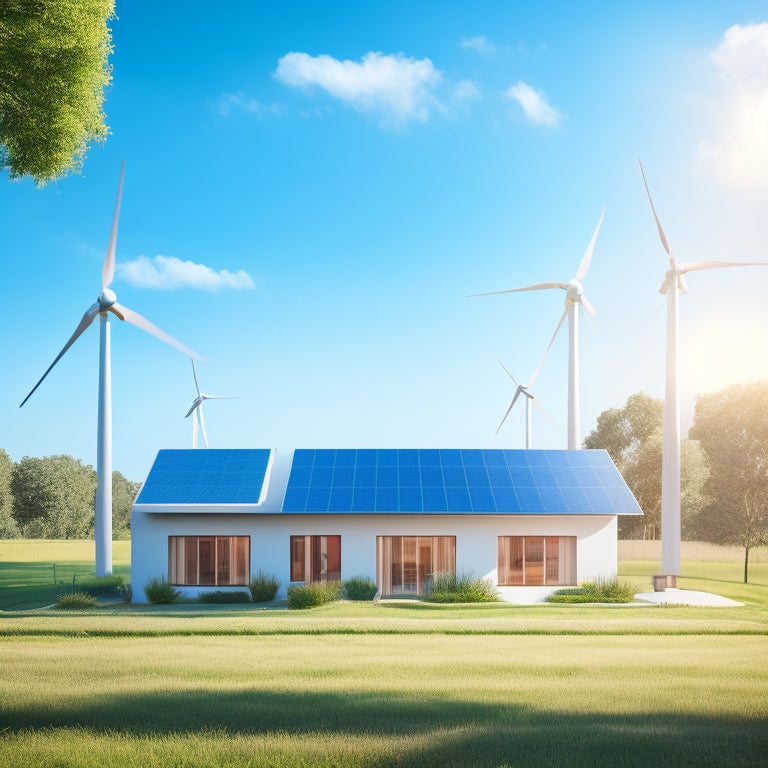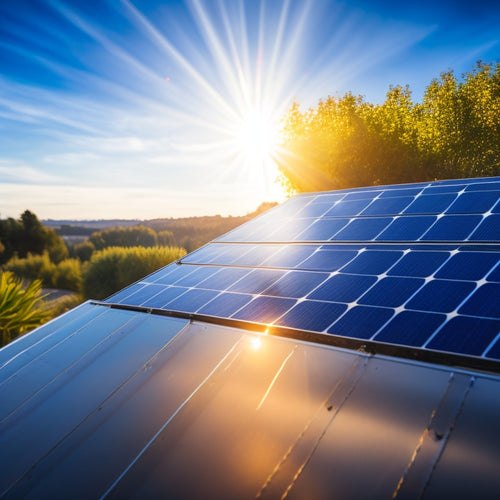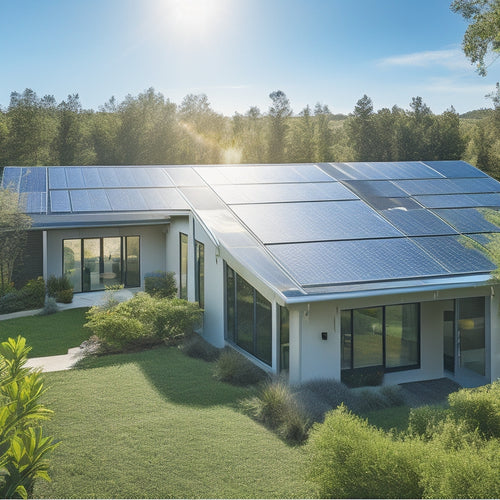
Top 3 Small House Energy System Brands
Share
You're looking for the top 3 small house energy system brands that can effectively generate, store, and convert energy for your home. Consider combining high-performing solar panels like Tesla's or SunPower's, with suitable energy storage solutions like Tesla Powerwall or Rolls-Surrette's lead-acid batteries, and efficient inverters from brands like SMA or Enphase. These brands stand out for their high-efficiency solutions, durability, and warranty alternatives. When evaluating these options, consider your specific energy needs, site conditions, and budget to guarantee a reliable and efficient system - and investigate how each brand's unique benefits can help you achieve energy autonomy in your small home.
Overview
- Top small house energy system brands prioritize high-efficiency solar panels, energy storage, and inverters for optimal energy harvesting.
- Brands like Tesla, Rolls-Surrette, and vanadium redox offer leading energy storage solutions with high capacity and durability.
- Inverters from brands like SMA, Fronius, and Enphase ensure high inverter efficiency (above 95%) and durability for harsh conditions.
- Effective site selection and system sizing are critical for small house energy systems to meet daily energy needs and maximize energy output.
- Leading brands provide comprehensive warranties and reliable customer support for small house energy systems, ensuring long-term performance and peace of mind.
Best Solar Panel Systems
Several high-quality solar panel systems are available on the market, each offering unique benefits and features that cater to different energy needs and budgets.
You'll want to take into account factors like solar panel efficiency, durability, and warranty when selecting the best system for your small house. Look for systems with high-efficiency panels that can maximize your energy output.
Additionally, reflect on the importance of grid connection to feed excess energy back and offset energy consumption.
Ideal site selection is also essential, considering factors like shading, wind direction, and snow load to guarantee maximum energy production.
Top Energy Storage Solutions
What's the most effective way to store the excess energy generated by your solar panel system? You want a solution that maximizes energy efficiency and aligns with your commitment to renewable sources.
Top energy storage solutions include lithium-ion batteries, lead-acid batteries, and flow batteries. When selecting an energy storage solution, it's crucial to evaluate factors like capacity, depth of discharge, and compatibility with your solar panel system, as well as assessing brand reputation and warranty options Top-Rated Solar Battery Brands.
Lithium-ion batteries, like Tesla Powerwall, offer high energy density and long lifetimes. Lead-acid batteries, such as Rolls-Surrette, provide a cost-effective option. Flow batteries, like vanadium redox batteries, offer scalable energy storage.
Leading Small Home Inverters
With your energy storage solution in place, it's time to focus on the next essential component of your small house energy system: the inverter.
You'll want an inverter that efficiently converts DC power from your energy storage system to AC power for your home. Look for an inverter with high inverter efficiency, typically above 95%, to minimize energy losses.
When evaluating inverters, consider the importance of energy requirements and sizing to guarantee the inverter can handle your daily energy needs. Additionally, a high peak efficiency rating, typically above 98%, is vital for maximum energy harvesting.
Durability is also key, as you'll want your inverter to withstand the test of time and harsh environmental conditions. Top brands offer inverters with IP65 ratings, confirming they can operate in dusty and wet environments.
Frequently Asked Questions
How Do I Determine the Best Energy System Size for My Small Home?
To determine the best energy system size for your small home, you'll need to conduct an energy needs assessment, considering factors like your daily energy usage and local sunlight hours, to accurately size your solar panel system.
Are Energy System Warranties Typically Transferable to New Homeowners?
Savvy seekers of sustainable energy, you'll be thrilled to know that most warranties are transferable, providing peace of mind and perpetual warranty coverage, which can greatly enhance homeowner benefits and your home's resale value.
Can I Install an Energy System Myself to Save on Labor Costs?
You can try a DIY energy installation to save on labor costs, but be cautious: improper installation can void warranties and compromise system efficiency, so weigh the risks and consider seeking professional guidance for ideal cost-saving techniques.
What Are the Typical Maintenance Requirements for Small Home Energy Systems?
Don't worry, you won't be stuck with a high-maintenance system; most small home energy systems require minimal upkeep, following a routine maintenance schedule to guarantee system efficiency, and you'll be enjoying your newfound energy freedom in no time!
Are Energy Systems Compatible With My Existing Electrical Infrastructure?
You'll need to assess your electrical infrastructure to guarantee energy system compatibility, checking factors like voltage, ampacity, and wiring capacity; a professional assessment will determine if your existing setup can support your new energy system.
Ready to Buy
As you commence your small house energy system expedition, remember that the right brand can make all the difference. You've got the top 3 brands for solar panels, energy storage, and inverters - now it's time to take control of your energy future. But will you utilize the power of renewable energy to break free from the grid, or will you let the status quo hold you back? The choice is yours.
Related Posts
-

Why Outdoor Solar Lighting Systems Are Sustainable
Outdoor solar lighting systems are sustainable because they utilize renewable energy, drastically reducing your carbo...
-

How Efficient Are Thin Film Solar Cells
Thin film solar cells provide an innovative approach to energy generation, boasting efficiency rates generally betwee...
-

Installing Metal Solar Roofs for Maximum Energy Efficiency
Installing metal solar roofs can drastically enhance your home's energy efficiency and durability. These roofs withst...


